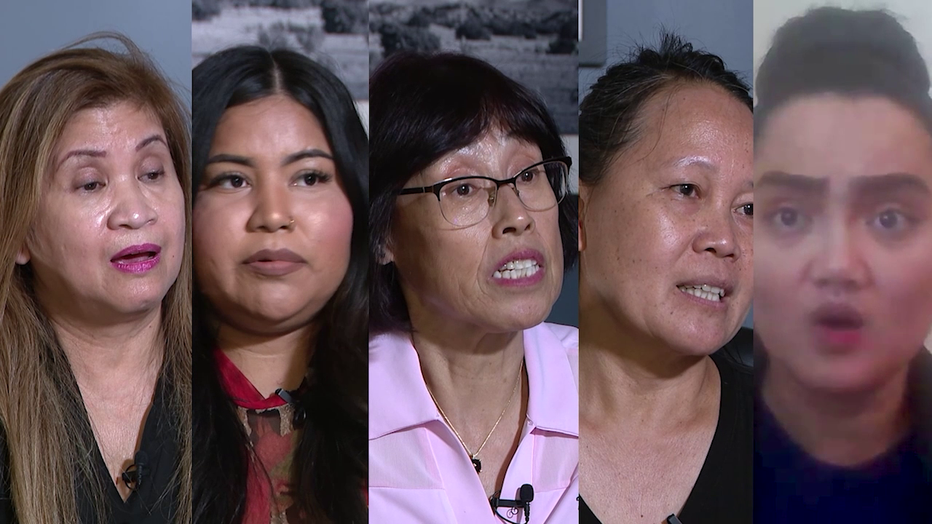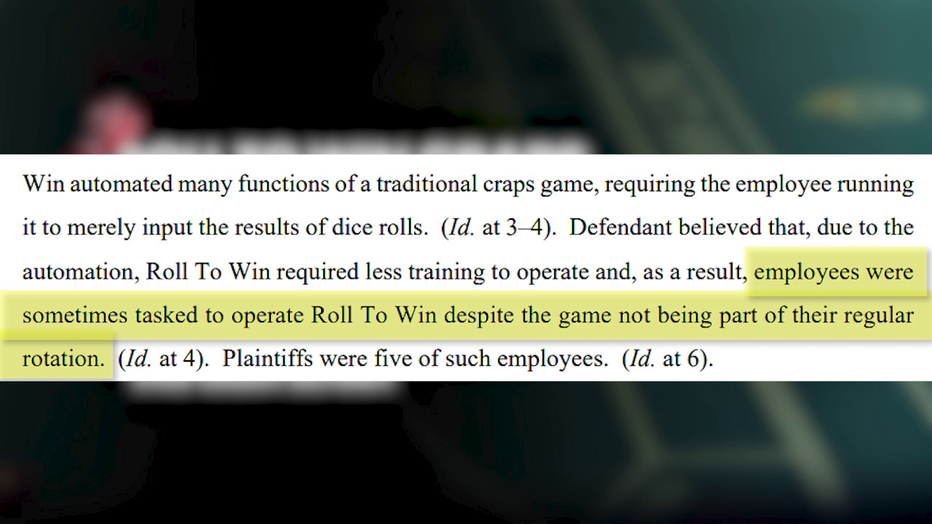Former Harrah's Ak-Chin Casino employees file suit saying they were wrongfully terminated
MARICOPA, Ariz. - Five former employees of Harrah's Ak-Chin Hotel & Casino are coming forward, saying the company wrongfully terminated them after initially accusing them of colluding with gamblers to cheat at an electronic craps game.
Since then, a lawsuit has been filed against Harrah’s, and the plaintiffs reveal why these former dealers feel like they were dealt a bad hand.
The buzz inside a casino can be contagious. Is it the thrill of the chase? High stakes and adrenaline fuel the atmosphere of a gambler’s world.
Stacks of chips, or lack thereof, on tables where, at one moment, you hear the roar of a win, or the deafening silence of disappointment.
Money is made and money is lost.
But, in the federal civil lawsuit against Harrah's Ak-Chin Hotel & Casino in Maricopa, five plaintiffs say their careers and reputations as dealers have been cheated, suing their former employer since being fired.

What is Roll to Win?
The root of this case is an electronic craps game, Roll to Win, that was the first of its kind. It was introduced at Harrah’s in summer 2022.
According to the plaintiffs, there are key differences between this game and the original craps version.
Aruze Gaming’s website shows a video of how Roll to Win is played, and says single-dealer game play is possible but "camera surveillance and pit boss supervision are still required."
Unlike standard craps table games, Roll to Win only requires one employee to operate the game instead of four. The player uses a touch screen at the station that the dealer can’t see.
The employee closes out bets, passes the dice to the player, then enters what they roll onto the touch screen.
Court documents say Harrah’s believed Roll to Win required less training for its dealers because of automation and employees were assigned to this game despite not being routinely tasked to operate it.

‘I knew I did nothing wrong’
"They come to me, and they only, only five minutes to show me. No training at all," Susan Samons, a plaintiff, said.
Necy Sundquist, another plaintiff, says, "Give the dice and just put the number in the computer and make sure it's correct."
The lawsuit says by fall 2022, Harrah’s lost a large amount of money on Roll to Win.
Court documents reveal the game had flaws, making it vulnerable to several cheating strategies, sparking an investigation.
Harrah’s learned nearly 20 table games dealers worked Roll to Win, alleging they colluded with cheating players.
Plaintiffs, like Mariah Henry, were questioned by her bosses.
"In the back of my mind, I knew I did nothing wrong," Henry said. "But, for them to tell me, it was really, like, traumatizing and scary."
Sundquist said, "I was just being honest with everything. I didn't even know about this game, and then trying to explain what really happened. Then, after that, after it was done, he just handed me over a paper."

The Ak-Chin Tribal Gaming Agency suspended all five women without pay, accusing them of theft, conspiring with patrons to cheat while working as dealers on Roll to Win.
Jie Xia, another plaintiff, recalls how she was notified.
"They said I lied. I lied, I cheated. Then the investigator said he's done with me because I'm a big liar," Xia said. "He said he's a good guy. He’s going to send me to the police and the FBI, he told me. He gave me a pre-prepared suspension letter. So, my license was suspended."
Attorney Jake Curtis specializes in tribal law and represented the five suspended employees in license revocation hearings held by the tribal gaming agency.
"Really the pattern was, that they, very clear to me, that they just simply had not been trained in the game," Curtis said. "And that they didn't know what they were doing."
He argued that Harrah’s did not properly train the dealers for Roll to Win, nor did they give warnings or disciplinary actions prior to suspension.
"Gamblers realized that if they were able to distract the dealers, while they were passing the dice, that they could roll the dice, before the bets had been closed out. So, they were able, in some instances, to make bets after they knew what their roll was, and so that was very lucrative," Curtis explained.
Henry says, "I guess they were able to see, like the number the dice rolled, and then they were able to put that in on their end."
Arizona Dept. of Gaming says staff weren't properly trained
According to the complaint, Harrah’s theory on cheating allegations turned out to be a bluff due to lack of evidence. Curtis and his clients say it’s clear that pit bosses did not pay attention to the game.
Ultimately, the tribal gaming agency allowed four of the plaintiffs to keep their license, recommending more training on cheating schemes. Jie Xia’s tribal license was revoked, but no criminal behavior was found by the commission.
As for state licensing, Arizona’s Department of Gaming refused to revoke licenses for all five women, ruling that Harrah’s failed to "properly train."

‘We need to tell the truth’
After the findings, Harrah’s still terminated the women.
"And they called me. They told me that ‘uphold termination.’ That is when my heart broken," Samons said.
Xia said, "I lose my entire career. I have years. I love the job as an immigrant. We make good money. And especially, I have a beautiful relationship with players, coworkers. I enjoy the job, but they destroyed."
Mary Grace Abon, another plaintiff, said while holding back tears, "My daughter is working in casino right now, and then she's asking me to work there, to apply. I said, ‘No. I can't.'"
The plaintiffs also claim Harrah’s blamed Roll to Win financial losses on dealers who are minority women without a great understanding of English. They want a jury trial, seeking punitive exemplary damages, accusing Harrah’s of wrongful termination related to discrimination and retaliation.
Harrah’s declined to talk to FOX 10 for this story, saying it doesn't comment on pending litigation.
As for these five women who are still traumatized, they say their career was not a game.
"We don't need to lie. That's the truth. What happened to us, why we lie? We already experienced the pain we have right now. Why do we need to lie? We need to tell the truth in order for them to learn not to do the same, same thing to other people," Abon said.
"I want justice for us," Samons said. "That we deserve."
Harrah’s did motion to dismiss the case, arguing that the casino was an "arm" of the Ak-Chin Indian Community and should have sovereign immunity. A judge denied the motion.

